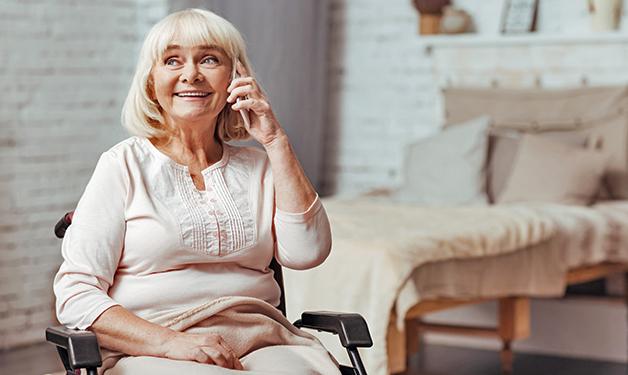
A telehealth program could increase access to expert knowledge and information after a stroke.
After a stroke, prevention of another is key. Prevention starts with a healthy lifestyle, yet many patients lack access to knowledge and experts that can help them make the right healthy living choices. Enter the Stroke Coach—a telehealth program to guide patients towards a healthy recovery and away from bad habits that could increase their risk of another stroke.
Led by Vancouver Coastal Health Research Institute (VCHRI) researchers Brodie Sakakibara and Janice Eng, the Stroke Coach connects stroke survivors with healthy living experts over the phone from the comfort of their home.

Patients can fall through the cracks without access to experts
Over 50 per cent of stroke survivors do not return to driving after their stroke, which can lead to difficulty accessing specialized care at a hospital or clinic. In addition, many recovery programs do not involve the in-depth follow-ups and personalized advice that are part and parcel of Stroke Coach, leaving patients to manage their health and wellbeing on their own.
“We spend a lot of time rehabilitating our patients, but we don’t yet have a formal protocol to help patients understand how to prevent another stroke,” says Eng, who is leading the Stroke Coach study.
Eng became aware of the need for an easy-to-access program when working with colleagues in rural areas, and discovering that some parts of BC have minimal rehabilitation services.

“We want to help our patients get on the path to recovery. This means helping them manage chronic disease, get enough physical activity, improve their diet and manage stress. Ultimately, we hope we can improve the quality of their lives.”
Reducing the burden of stroke in Canada
In 2013, over 405,000 people in Canada had experienced the effects of a stroke. The risk of stroke increases with age, and the recurrence of stroke is estimated to be 13 per cent within one year of the first stroke and 25-33 per cent after five years. Lifestyle management has been shown to decrease that risk.
The protocol being tested by Eng and Sakakibara builds on evidence-based research into the success of lifestyle coaching. However, Stroke Coach is unique in that it provides lifestyle coaching, self-monitoring and a self-management manual for stroke patients that empowers them to better manage their health after a stroke.
The Stroke Coach study is open to stroke survivors from across BC. Participants receive seven telephone lifestyle coaching sessions over the course of six months. During the 30- to 60-minute sessions, a trained lifestyle coach shares information with patients about how to self-manage and monitor their health using a self-monitoring kit that includes blood pressure and activity monitors.

If their results are positive, Sakakibara believes the protocol could have applications for managing other diseases.
“The next step would be to identify where in the health care system this program should be implemented. It is not going to replace services currently provided, but it could be an add-on to improve patient care and recovery.”


